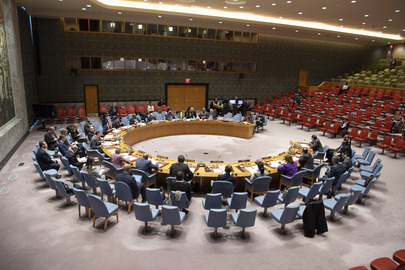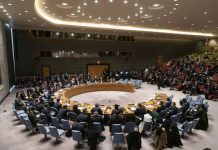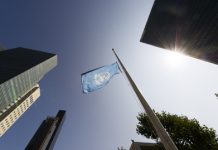The conflict, between the Sudanese Armed Forces (SAF), and the paramilitary Rapid Support Forces (RSF), is the cause of a major humanitarian crisis, not only in the country itself, but also in neighbouring States. The crisis has proven to be particularly dangerous for people who have already been driven from their homes and, according to the UN refugee agency, UNHCR, thousands are fleeing the country every day.
The situation within the country is dire: attacks on Sudanese displacement camps in the North Darfur region, currently the hotspot of the conflict, have resulted in multiple civilian casualties, and the UN has made an urgent call for action to prevent widespread famine.
Out of a population of some 50 million, almost 25 million Sudanese face acute food insecurity, and the number is expected to grow. “With the rainy season starting soon, and flooding along key routes likely to compound access challenges, time is running out,” Stéphane Dujarric, the UN Spokesperson, warned
1. Over 3 million have fled the country
As of this year, Sudan is the largest displacement crisis in the world. “Today, one-third of Sudan’s entire population is displaced. The consequences of this horrific and senseless conflict spread far beyond Sudan’s borders,” said Filippo Grandi, UN High Commissioner for Refugees, in February.
In total, around 3.8 million refugees have crossed Sudan’s borders, creating a significant crisis: they are often extremely vulnerable, facing shortages of food, water, and medical care. The UN expects that number to rise by about one million in 2025.
The countries surrounding Sudan were already barely managing to cope with mass displacement before the war – just the latest in a series of conflicts and periods of instability stretching back to the 2003 Darfur crisis – erupted in April 2023.
These countries are already hosting large refugee and internally displaced populations and their humanitarian programmes are severely underfunded. Moreover, those leaving Sudan are arriving in remote locations, which makes it difficult to get access to them.
Chad and Egypt have received the biggest numbers: Egypt is currently hosting around 600,000 Sudanese and in Chad over 700,000 have been registered (the Chadian government has estimated that this number could rise to almost one million by the end of 2025).
2. Struggle to maintain basic services
Neighbouring countries are struggling to cope with the increased demand on healthcare, education and other basic services. According to the UN aid office, OCHA, the influx has overwhelmed health facilities in Chad, Egypt, Ethiopia and South Sudan, where medicines, supplies and personnel are in short supply.
The lack of clarity over the level of donor contributions this year has added an extra layer of uncertainty for those concerned. For example, it has forced UNHCR to suspend all medical treatment for refugees who crossed the northern border to enter Egypt. This means suspending procedures such as cancer surgery, heart operations and medication for chronic diseases, affecting some 20,000 patients.
3. Ideal conditions for the spread of disease
The World Health Organisation (WHO) warned in 2024 that the situation in Sudan was approaching a “perfect storm,” because of a barely functioning health system, large numbers of people sheltering in overcrowded areas lacking access to water and sanitation, food and the most basic services.
As expected, the collapse of healthcare infrastructure has led to the spread of diseases, which have crossed borders and affected neighbouring countries hosting large numbers of refugees, who have a greater vulnerability to preventable diseases, due to plummeting vaccination rates in Sudan. Humanitarian partners have reported increased disease cases and concerns for outbreaks, particularly in border areas and shelter sites.
4. Growing insecurity
The countries surrounding Sudan (Egypt, Libya, Chad, South Sudan, Ethiopia, Eritrea and the Central African Republic) were all grappling with their own domestic crises before the war, such as internal conflict, hunger and disease.
The conflict has led to increased violence and instability in border regions, and there have been reports of cross-border fighting. In Chad, the flow of weapons and the presence of armed groups have reportedly increased violence and insecurity, whilst a militia group in South Sudan is reported to have allied itself with the RSF in Sudan, one of the parties to the war.
5. Sexual violence – scars of Sudan’s war
Sexual violence is also being weaponised in Sudan’s conflict, putting millions of children at risk. The brutal reality of this violence, and the fear of falling victim to it, is pushing women and girls to leave their homes and families, only to face further dangers as they become internally displaced and cross borders requiring medical and psycho-social services..
UNICEF reported in March that girls often end up in informal displacement sites with scarce resources, where the risk of sexual violence is high. Of the reported child rape survivors, 66 per cent are girls.
Meanwhile, boys face their own difficulties. With deep-seated stigma, reporting sexual assault presents its challenges, making it harder to seek help and access services.
Shockingly, 16 of the survivors were under five years old, including four one-year-olds.
Gender violence is being used as a weapon of war in Sudan.
6. Economic disruption, rising regional poverty
The conflict has disrupted trade routes and economic activities, affecting the livelihoods of people in neighbouring countries, leading to increased poverty and economic hardship.
In Ethiopia and Egypt, border restrictions and insecurity along trade corridors has led to increased transportation costs and a big drop in cross-border economic activity, whilst in Chad and South Sudan, the massive influx of refugees has diverted resources from other critical areas of the economy.
Source of original article: United Nations (news.un.org). Photo credit: UN. The content of this article does not necessarily reflect the views or opinion of Global Diaspora News (www.globaldiasporanews.net).
To submit your press release: (https://www.globaldiasporanews.com/pr).
To advertise on Global Diaspora News: (www.globaldiasporanews.com/ads).
Sign up to Global Diaspora News newsletter (https://www.globaldiasporanews.com/newsletter/) to start receiving updates and opportunities directly in your email inbox for free.




























